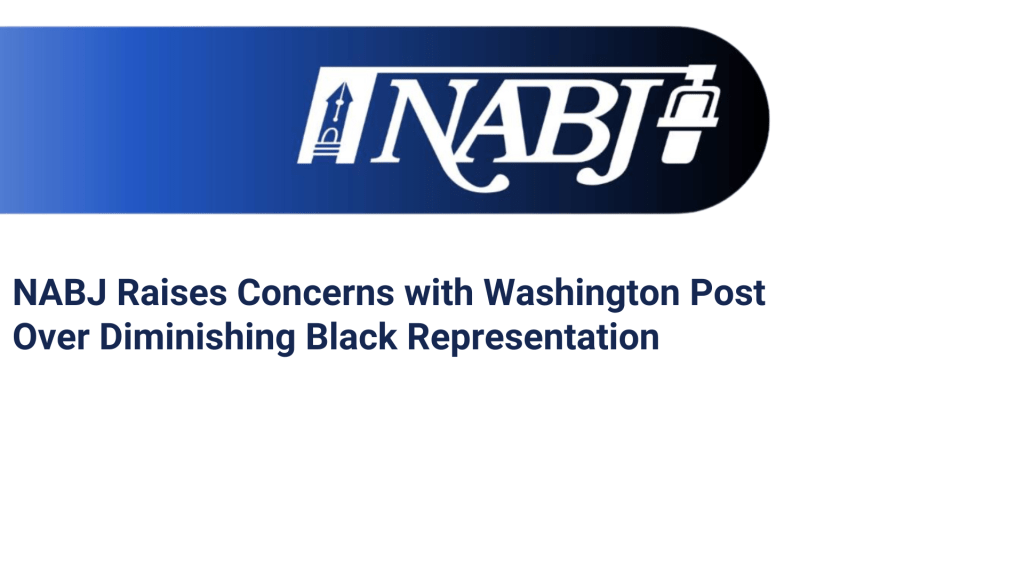NABJ Raises Concerns with Washington Post Over Diminishing Black Representation
NABJ REMEMBERS LEGENDARY JOURNALIST BELVA DAVIS
09/25/20252025 NABJ-University of Florida Award in Multimedia Investigative Journalism winner
10/08/2025
FOR IMMEDIATE RELEASE
COLLEGE PARK, Md. (Sept. 29, 2025) The National Association of Black Journalists (NABJ) met today with leadership at The Washington Post to raise urgent concerns about the environment for Black journalists at the paper following the firing of columnist Karen Attiah and the recent departures of several Black reporters, editors and senior staff members.
NABJ President Errin Haines emphasized during the meeting that The Washington Post must remain committed to representation and diversity, especially given the industry’s history and the paper’s legacy of hiring, retaining, and promoting Black journalists. Today, NABJ is once again watching to see whether The Post will build on that legacy or retreat from it.
“The absence of Black journalists doesn’t just harm us — it impoverishes the entire profession. When our voices are missing, stories go untold, perspectives go unchallenged, and the truth remains incomplete,” said NABJ President Errin Haines.
The dismissal earlier this month of Attiah, who was the founding Global Opinions editor responsible for bringing diverse perspectives to the paper’s pages, has raised an alarm about the erosion of Black voices across the media. NABJ leaders emphasized that while Attiah’s case will follow its own legal path, the larger issue is the pattern of newsroom decisions happening amid attacks on diversity that undermine both the First Amendment and the presence of Black journalists.
Haines stressed that The Washington Post cannot retreat from its responsibility to representation and diversity. The paper has a history of elevating Black journalists, but that progress is fragile. As the Kerner Commission warned more than 50 years ago, when newsrooms fail to reflect the communities they cover, trust erodes and democracy suffers.
“I’m encouraged that The Washington Post willingly meets with us and does not shy away from difficult conversations,” NABJ Vice President-Print Eva D. Coleman said. “Our advocacy is focused on issues, and we will continue to have discussions to move the industry forward.”
NABJ will be watching whether The Post builds on its legacy or abandons it.
Leadership at The Post, represented by Executive Editor Matt Murray, acknowledged the challenges of newsroom restructuring. He outlined steps underway, including a new two-year internship program designed to expand access for journalists of color, a willingness to meet with existing Black staff and a commitment to improve career development and retention of diverse staff. Still, our concerns remain about the impact of recent departures, particularly Black editors, and the effect on newsroom culture.
NABJ underscored four key priorities during the meeting:
- A transparent accounting of current staff demographics, especially in leadership.
- A clear plan to replace Black journalists who have left, with urgency around leadership roles.
- Tangible measures to support the Black staff who remain.
- A formal partnership between NABJ and The Post to ensure accountability.
We appreciate that The Post expressed openness to future collaboration and to addressing its public image in light of recent events. NABJ will continue to monitor progress closely, and we expect to see follow-through in the coming months.
“This is a tense moment in history for journalists nationwide. How we advocate for Black journalists today will be felt for years to come,” said Washington Association of Black Journalists (WABJ) President Phil Lewis, who joined Haines and Coleman in Tuesday’s meeting. “WABJ is thankful for the leadership of President Haines, who made it clear to Post leadership that tangible action steps are necessary.”
At 50 years, NABJ’s mission is clear: Black journalists are essential. Our presence strengthens democracy. Our leadership holds institutions accountable. And we will not be silent when our voices are diminished.
For media inquiries, contact press@nabj.org












